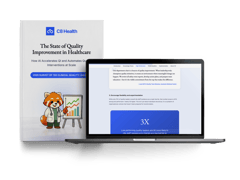
Information Management vs. Knowledge Management: A Comparison
In healthcare, information is supposed to save lives. Yet paradoxically, the explosion of medical data, content, and knowledge is overwhelming doctors and nurses, potentially putting patients at risk.
Every day, clinicians face a torrent of information-electronic health records, research papers, and clinical guidelines. This flood of data, meant to improve care, often leaves providers struggling to stay afloat. Critical details get lost in the noise, leading to missed diagnoses, treatment delays, and medical errors.
» Find out how efficient knowledge management boosts patient care
To address the issue, we need to bridge information and knowledge management. The first step is comparing the two approaches to see how you can transform raw data into actionable insights.
» Bridge knowledge and information management and access your institution's clinical guidance
Information vs. Knowledge Management: Scope of Use
Information management focuses on IT systems, handling the raw data that feed healthcare. On the other hand, knowledge management deals with people, processes, and the application of up-to-date know-how with crucial context. It's essential for improving operational efficiency.
» Implement best practices for knowledge management in healthcare
Both are important in healthcare, but knowledge management combines electronic systems with individual clinician expertise, making it more valuable for improving patient care.
It prioritizes processes to simplify knowledge sharing and collaboration, leveraging the data infrastructure provided by information management. Essentially, the two approaches feed into each other, and software that combines them can be a single source of truth.
» Explore the different types of health IT technology in healthcare
The software consolidates information from various sources into a central location, removing the need for clinicians to search through scattered resources and improving efficiency.
To learn more, download our latest white paper.
Information vs. Knowledge Management: Data Handling
Hospitals operate with a dual focus on financial health and patient care. The revenue cycle-which information management heavily influences-ensures accurate billing for services.
» Find out how to reduce costs with knowledge management systems
On the other hand, the clinical side prioritizes knowledge management. Clinicians integrate information about procedures with a patient's medical history and test results to make optimal decisions.
Information vs. Knowledge Management: Implementation
While basic information systems can track services provided or store patient details, this is just raw data. Proper understanding comes from knowledge management, which involves integrating other sources like medical guidelines, reference materials, and expert opinions.
It's about taking the material and turning it into actionable advice that healthcare professionals can use to make better decisions. Building such a system requires more effort and resources than simply storing facts, but the benefits are clear.
» Learn to harness information using knowledge management
This approach also helps healthcare providers to navigate the new drug data and extract key points that directly improve patient outcomes. While it can be time-consuming to delve into everything, having access to this richer understanding of a patient's health is invaluable.
Information vs. Knowledge Management: Implementation: User Impact
Information management systems help healthcare providers access a patient's complete medical history, medications, allergies, and test results in one place. This comprehensive view can lead to more accurate diagnoses and effective treatment plans.
On the other hand, knowledge management systems are a safety net and a powerful tool for professional growth for healthcare workers. Instead of spending hours searching for information in books or articles, proper software can deliver relevant knowledge right when it's needed at the point of care, freeing up valuable time for nurses and doctors.
» Download the Report: The State of Knowledge Management in Healthcare
Future Developments
The future of healthcare hinges on advancements in both information and knowledge management. Data systems need to become faster and more streamlined to minimize delays between entry and usability. Ideally, accurate information should be easily available.
» Check out the latest advancements in medical technology
Knowledge management systems have immense potential to improve patient outcomes and the overall value proposition of healthcare. Healthcare needs to be "smart" about delivering services. To be truly effective, these systems need clinician involvement from the very beginning of development, fostering collaboration with data scientists and developers.
Trying to fit clinicians into a pre-built system is a recipe for wasted resources. Involving them from the start ensures the system meets their needs and avoids a complete overhaul later.
Resolving the Data Deluge in Healthcare
As healthcare continues its digital transformation, the industry must recognize that more information only sometimes leads to better care. The future of medicine lies not in amassing data but in harnessing it effectively.
By embracing knowledge management strategies, healthcare organizations can reduce information overload. These approaches-from AI-powered clinical decision support tools to collaborative learning platforms-promise to distill the essence of medical knowledge, making it accessible and applicable when and where it's needed most.
» Find out how AI assists modern healthcare
The path forward is clear: To truly leverage the power of information in healthcare, we must evolve from data hoarders to knowledge curators. Only then can we fulfill the promise of the information age in medicine, empowering healthcare professionals to provide the best possible care for every patient.
» Combine information and knowledge management for better care coordination



